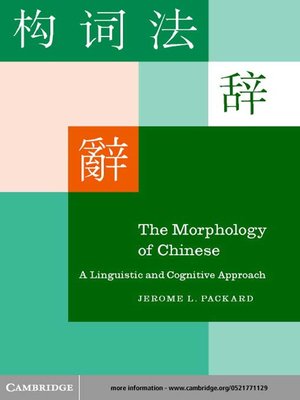
Sign up to save your library
With an OverDrive account, you can save your favorite libraries for at-a-glance information about availability. Find out more about OverDrive accounts.
Find this title in Libby, the library reading app by OverDrive.



Search for a digital library with this title
Title found at these libraries:
| Library Name | Distance |
|---|---|
| Loading... |
This ground-breaking study dispels the common belief that Chinese 'doesn't have words' but instead 'has characters'. Jerome Packard's book provides a comprehensive discussion of the linguistic and cognitive nature of Chinese words. It shows that Chinese, far from being 'morphologically impoverished', has a different morphological system because it selects different 'settings' on parameters shared by all languages. The analysis of Chinese word formation therefore enhances our understanding of word universals. Packard describes the intimate relationship between words and their components, including how the identities of Chinese morphemes are word-driven, and offers new insights into the evolution of morphemes based on Chinese data. Models are offered for how Chinese words are stored in the mental lexicon and processed in natural speech, showing that much of what native speakers know about words occurs innately in the form of a hard-wired, specifically linguistic 'program' in the brain.







